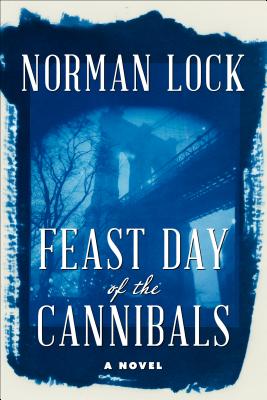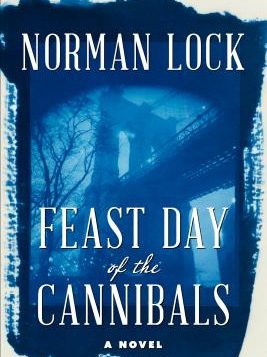 Feast Day of the Cannibals
Feast Day of the Cannibals
by Norman Lock
Bellevue Literary Press. 240 pages, $16.99
IN 1882, in Gilded Age New York, Washington Roebling, disabled by caisson disease (“the bends”), supervises construction of the Brooklyn Bridge from a second-story window in Brooklyn. Herman Melville, forgotten by the reading public, works as the chief inspector in the New York Customs House. And Samuel Clemens encourages Ulysses S. Grant, dying of throat cancer, to write his memoirs.
These historical figures all appear in Norman Lock’s novel, along with his fictional protagonist Shelby Ross, a man with aristocratic manners and a classical education courtesy of the inherited fortune he lost when the Panic of 1873 ruined his business. As the novel opens, Ross has just begun working under Melville in the Customs House for three dollars a day. He visits Roebling, a childhood friend, and tells him the story of his downfall and the drudgery of his present work.
There are several novels with gay themes about 19th-century American writers. In The Whale, Mark Beauregard imagines a brief love affair between Herman Melville and Nathaniel Hawthorne. Edmund White, in Hotel De Dream, has Stephen Crane write the novel about the love affair of a banker and a boy prostitute in New York that he abandoned when warned it would end his career. Most notable is The Master, Colm Tóibín’s brilliant recreation of the emotional life of Henry James. In his “American Novels” series, Norman Lock has previously published novels about Dickinson, Thoreau, Poe, Whitman, and Twain. Feast Day of the Cannibals is the first of his novels to explore the lives of 19th-century men who felt a sexual attraction to each other.
Feast Day is an old-fashioned novel in a number of ways. Lock has scrupulously researched the New York of the 1880’s. Starting with the Brooklyn Bridge, the engineering marvel of the era, he creates a travelogue of the metropolis, from the wharves and ships near the Customs House, through the streets extending from the Battery to the recently completed Central Park. There are graphic descriptions of the bad food served in cheap restaurants and the huge amounts of drink consumed in disreputable saloons. As he narrates his story, Ross comments on the financial, political, and literary figures of the day, a way of providing a history lesson for readers who need it.
Lock’s recreation of a past time and place is impressive, but his signal achievement in this novel is the voice of its narrator, Shelby Ross. It takes nerve for a writer to place a fictional character in dialogue with Herman Melville. Lock pulls it off. Like Melville, Ross knows the Bible and Shakespeare, and, like his interlocutor, failure has taught him to despair of the human condition. Here is how he describes Melville to Roebling: “You are Jonah, stricken with misfortune and thrust into the belly of a great fish. So, too, is Melville, who labors in a darkness of his own—barred from life by the enormous teeth of a cruel engine that gins him fine. Unless he gnaws on himself, like a dry biscuit. Roebling, we are all Jonases [sic]—shut up inside our own thoughts, as if in rooms needing to be aired.” Lock does not merely imitate 19th-century prose; he makes it his own, with verbal flourishes worthy of Melville.
The plot of Feast Day, also old-fashioned, is carefully constructed and deftly concluded, leading Ross and the young man he doesn’t know he loves inexorably to their fate. In his work in the holds of ships, Ross meets two men: Gibbs, a man of pure evil; and Martin Finch, a handsome, slight youth, half his age, who has a beautiful singing voice and loves books. Gibbs, like other characters in the book, immediately senses something lacking in the manliness of Ross. Tending to act on his sexual attraction to other men, Gibbs sets his sights on Ross. Ross is appalled by Gibbs but cannot stay away from him. Emotionally, however, Ross is drawn to Martin, who welcomes his friendship.
The world of same-sex attraction exemplified by Gibbs is lurid and sadistic. Lock does not offer any alternative to this version of how men who loved men in the 19th century might live. Like many literary figures of pure innocence, Martin is not a strongly drawn character, so we never know much of his inner life, although his affection for Ross is clear. Whereas Gibbs and Martin know who they are, Ross does not. He realizes he has betrayed Martin, but he cannot acknowledge the impulses that led him to do so. In an imagined ending to his story, Ross envisions a future in which “our descendants will have finally found an all-embracing word for love.” But he quickly dismisses this “heroic” vision and gives his listener, Roebling, a more “plausible”—and despairing—conclusion to his tale. In his inability to accept the longings of his heart, Shelby Ross is ultimately a sympathetic, if frustrating, character. He never understands what he might have had with Martin Finch.
Daniel A. Burr is a frequent contributor to this magazine.






